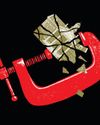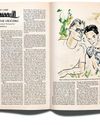Try GOLD - Free
ELEMENTAL NEED
The New Yorker
|March 06, 2023
Phosphorus helped save our way of life—and now threatens to end it.

In the fall of 1802, the German naturalist Alexander von Humboldt arrived in Callao, Peru’s major port, just west of Lima. Humboldt had timed his visit to coincide with a transit of Mercury, which he planned to observe through a three-foot telescope, in order to determine Lima’s longitude. He set up his instruments atop a fort on the waterfront, and then, with a few days to kill before the event, wandered the docks. A powerful stench emanating from boats loaded with what looked like yellowish clay piqued his curiosity. From the locals, Humboldt learned that the material was bird shit from the nearby Chincha Islands, and that it was highly prized by farmers in the area. He decided to take some home with him.
When human beings invented agriculture, some ten thousand years ago, they were, almost immediately, confronted with a conundrum. Crops need nutrients to grow, but harvesting them removes the nutrients, leaving the soil unfit for future harvests. Early farmers got around this bind by letting some fields lie fallow; spreading animal waste, including their own, on the land; and planting legumes, which possess restorative properties. But they had no clear idea why these practices worked. By Humboldt’s day, savants in Paris and London were starting to figure out what it was, exactly, that crops required. A Prussian chemist analyzed some of the clay Humboldt had brought home and found that it contained high concentrations of two essential nutrients: nitrogen and phosphorus. Guano offered an answer to the age-old problem of soil exhaustion; as Gregory Cushman, a historian at the University of Kansas, has observed, it “was the Miracle-Gro” of its moment.
This story is from the March 06, 2023 edition of The New Yorker.
Subscribe to Magzter GOLD to access thousands of curated premium stories, and 10,000+ magazines and newspapers.
Already a subscriber? Sign In
MORE STORIES FROM The New Yorker

The New Yorker
THE TALK OF THE TOWN
The militarization of American cities, including Los Angeles, Portland, and Chicago, has brought home a perverse irony. T
4 mins
October 20, 2025

The New Yorker
THIS IS MISS LANG
The brief life and forgotten legacy of a remarkable American poet.
19 mins
October 20, 2025

The New Yorker
RAMBLING MAN
Peter Matthiessen's quest to escape himself—at any cost.
15 mins
October 20, 2025

The New Yorker
DEGREES OF HOSTILITY
How far will the Administration's assault on colleges and universities go?
26 mins
October 20, 2025

The New Yorker
GOINGS ON
What we're watching, listening to, and doing this week.
6 mins
October 20, 2025

The New Yorker
READY OR NOT
Zohran Mamdani wants to transform New York City. Will the city let him?
37 mins
October 20, 2025

The New Yorker
Alexandra Schwartz on Joan Acocella's "The Frog and the Crocodile"
When I am stuck on a sentence or trying to wrestle an idea into shape, I turn to Joan Acocella.
3 mins
October 20, 2025

The New Yorker
A BROTHER'S CONVICTION
Did a grieving man's quest for justice go too far?
43 mins
October 20, 2025

The New Yorker
THE KEY TO ALL MYTHOLOGIES
Why the quest for a master code goes on.
13 mins
October 20, 2025

The New Yorker
FOR ART'S SAKE
\"Blue Moon\" and \"Nouvelle Vague.\"
6 mins
October 20, 2025
Translate
Change font size
